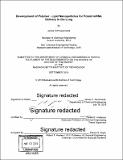Development of polymer - lipid nanoparticles for potent mRNA delivery to the lung
Author(s)
Kaczmarek, James Cliff.
Download1103314257-MIT.pdf (22.63Mb)
Other Contributors
Massachusetts Institute of Technology. Department of Chemical Engineering.
Advisor
Daniel G. Anderson.
Terms of use
Metadata
Show full item recordAbstract
Messenger RNAs (mRNAs) are an emerging therapeutic modality that holds great promise to specifically and completely treat genetic disease. mRNA has been used as a vaccine, as a protein replacement therapy, and even as a means of inducing permanent genomic editing via CRISPR. However, unlike traditional small molecule drugs, naked mRNA cannot readily enter the cellular cytosol, where it must localize in order to be successfully translated. The field of nucleic acid delivery, therefore, is largely concerned with the development of materials which can encapsulate mRNA and facilitate its transport into cellular cytoplasm in vivo. Many lipid nanoparticles originally designed to deliver short interfering RNA (siRNA) have been successfully repurposed to deliver mRNA, although their application is limited mainly to the liver. Thus, there is a continued need for the development of new materials for mRNA delivery in order to expand its therapeutic potential throughout the body. Another class of nucleic acid delivery materials, poly(P-amino ester)s, or PBAEs, have been successful in delivering DNA cargo in vitro and in vivo, but their capacity for mRNA delivery has been relatively understudied. In this thesis, we utilized formulation techniques developed for lipid nanoparticles to systemically deliver mRNA-loaded PBAEs. We showed that non-covalent formulation of PBAE-mRNA nanoparticles with a polyethylene glycol-lipid conjugate imparts serum stability to the nanoparticles, which in turn correlates with in vivo efficacy. Specifically, we demonstrated that these materials are mainly effective in lung tissue following intravenous administration. The lung targeting and potency of these nanoparticles was then greatly improved through statistical optimization of the polymer synthesis and nanoparticle formulation. These optimized nanoparticles transfected the majority of lung endothelial cells, as well as a variety of immune cells populations. The nanoparticles were also used as a means of quantitatively comparing mRNA and DNA delivery in vitro and in vivo. We showed a drastic decrease in DNA potency in vivo compared to mRNA, attributed to the difficulty in crossing the nucleus of slowly dividing cells. Moreover, we observed similar kinetics of protein expression between mRNA and DNA. Additionally, we demonstrated in in vitro proof-of-concept studies that PBAE nanoparticles are capable of CRISPR-mediated genome editing. We also show successful mRNA delivery in a variety of other tissues beyond the lung endothelium. Through the development of novel chemistries using both PBAEs and lipids, we were able to achieve mRNA delivery specifically to the lung endothelium as well as the spleen in vivo. Taken together, the materials developed herein greatly expand the therapeutic capabilities of mRNA. It is our hope that the work presented in this thesis translates into therapeutically relevant treatments while also providing insight into design criteria for successful mRNA delivery.
Description
Thesis: Ph. D., Massachusetts Institute of Technology, Department of Chemical Engineering, 2018 Cataloged from PDF version of thesis. Includes bibliographical references (pages 180-199).
Date issued
2018Department
Massachusetts Institute of Technology. Department of Chemical EngineeringPublisher
Massachusetts Institute of Technology
Keywords
Chemical Engineering.